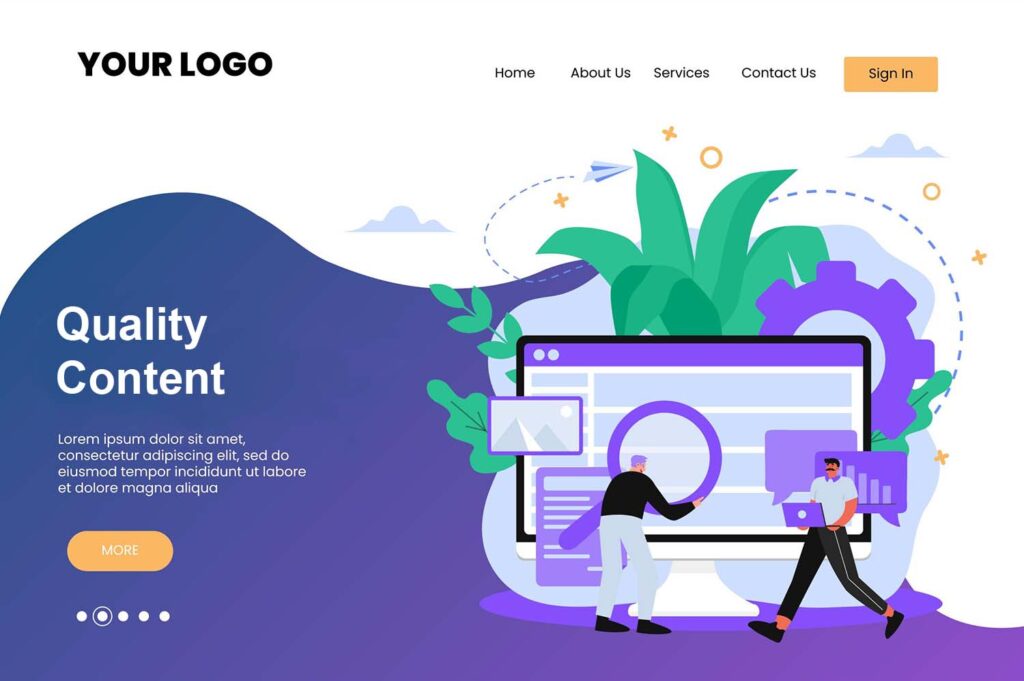Introduction
In today’s digital world, having a website is essential for any business’s success. However, simply having a website is not enough. Your website needs to have high-quality content that engages your target audience, answers their questions, and convinces them to take action. In this article, we will explore the importance of high-quality website content and how it can impact your business’s online success.
Why is High-Quality Website Content Important?
- Boosts Visibility in Search Engines When people search for information online, search engines crawl through millions of websites to find relevant content. High-quality website content, such as blog posts, articles, and web pages, that are optimized with relevant keywords, can help your website rank higher in search engine results pages (SERPs). This, in turn, increases the visibility of your website and makes it easier for potential customers to find you.
- Builds Credibility and Trust When your website provides high-quality content that answers your audience’s questions and provides valuable information, it helps to build credibility and trust with your target audience. This makes it more likely for them to engage with your brand and make a purchase. On the other hand, low-quality content that is irrelevant, outdated, or poorly written can make your business appear unprofessional and drive potential customers away.
- Increases User Engagement High-quality website content that is engaging and informative can help to keep your target audience on your website for longer periods. This, in turn, can increase user engagement, reduce bounce rates, and improve your website’s overall performance.
- Drives Conversions Ultimately, the purpose of your website is to drive conversions. High-quality website content can help to convince potential customers to take action, whether it be making a purchase, filling out a contact form, or subscribing to your newsletter. By providing high-quality content that is relevant to your audience, you can increase the likelihood of conversion and boost your business’s bottom line.
How to Create High-Quality Website Content
- Understand Your Target Audience Before you start creating content for your website, it’s essential to understand your target audience. Who are they? What are their pain points? What questions do they have? By understanding your target audience, you can create content that speaks directly to their needs and interests.
- Conduct Keyword Research Keyword research is the process of identifying the search terms that your target audience uses to find information online. By incorporating these keywords into your website’s content, you can increase the likelihood of your website appearing in relevant search results.
- Write Compelling Headlines Your website’s headlines are the first thing that your target audience will see. They need to be compelling, engaging, and informative. A great headline can pique your audience’s interest and convince them to read on.
- Provide Valuable Information High-quality website content provides valuable information that helps your target audience solve their problems, answer their questions, or learn something new. By providing valuable information, you can build credibility and trust with your audience, and increase the likelihood of engagement and conversion.
- Use Visuals Visuals, such as images, infographics, and videos, can help to break up your website’s content, make it more engaging, and increase user engagement. However, it’s essential to use visuals that are relevant and add value to your content.
- Edit and Proofread Finally, it’s essential to edit and proofread your website’s content before publishing it. This ensures that your content is reliable.
Common Mistakes to Avoid
While creating high-quality website content is essential, there are some common mistakes that businesses often make that can impact the effectiveness of their content. Here are some of the most common mistakes to avoid:
- Keyword stuffing: Using too many keywords in your content can make it sound unnatural and spammy. Instead, focus on creating content that is informative and useful to your audience.
- Ignoring user intent: Your website’s content should address the intent of the user who is searching for it. If your content doesn’t address their needs or answer their questions, they will quickly leave your site and find another source.
- Poor grammar and spelling: Your website’s content should be well-written, error-free, and easy to understand. Poor grammar and spelling can make your business appear unprofessional and damage your credibility.
- Plagiarism: Copying content from other websites can result in legal issues and harm your website’s search engine rankings. Always create original content that adds value to your audience.
Conclusion
In conclusion, high-quality website content is crucial for any business’s success in today’s digital world. By creating content that is informative, engaging, and valuable to your target audience, you can boost your website’s visibility in search engines, build credibility and trust with your audience, increase user engagement, and drive conversions. By avoiding common content mistakes and following best practices, you can create content that helps your business stand out from the competition and achieve your online goals. Remember, the power of words can make or break your website’s success, so invest in creating high-quality content that resonates with your target audience.
FAQs

How often should I update my website’s content?
It’s a good idea to update your website’s content regularly, such as weekly or monthly, to keep it fresh and relevant. However, the frequency of updates will depend on your business and industry.
Can I outsource my website’s content creation?
Yes, many businesses outsource their website’s content creation to professional content writers or agencies. Just make sure that the content is high-quality and aligns with your brand’s voice and values.
How can I measure the effectiveness of my website’s content?
You can use analytics tools, such as Google Analytics, to track your website’s performance, including user engagement, bounce rates, and conversion rates. This can help you identify areas where you can improve your website’s content.
How important is the length of my website’s content?
While there is no set rule for how long your website’s content should be, research suggests that longer content tends to perform better in search engine rankings and user engagement. However, the length of your content should always be dictated by the value it provides to your audience.
Should I focus on creating content for search engines or my audience?
While search engine optimization (SEO) is important for increasing your website’s visibility in search results, your primary focus should always be creating content that is valuable to your audience. By focusing on the needs and interests of your target audience, you can create content that is engaging and relevant, and ultimately drive more traffic and conversions to your website.
How can I make my website’s content more engaging?
There are several strategies you can use to make your website’s content more engaging, such as:
Using headlines and subheadings to break up your content and make it easier to read.
Incorporating visuals, such as images and videos, to help illustrate your points and add interest.
Including calls-to-action (CTAs) that encourage your audience to take a specific action, such as subscribing to your newsletter or making a purchase.
Using storytelling techniques to connect with your audience on a deeper level and make your content more memorable.
Can I repurpose my website’s content for other platforms?
Yes, repurposing your website’s content for other platforms, such as social media, email newsletters, or ebooks, can help you reach a wider audience and maximize the value of your content. Just make sure to tailor your content to the specific platform and audience you are targeting.
How important is the tone and voice of my website’s content?
The tone and voice of your website’s content play a critical role in how your audience perceives your brand and message. By establishing a consistent tone and voice that aligns with your brand’s values and personality, you can build a stronger connection with your audience and differentiate yourself from competitors.








